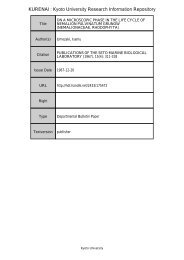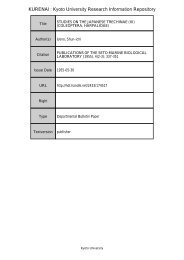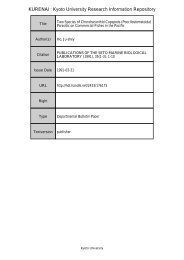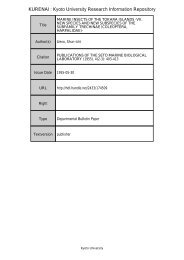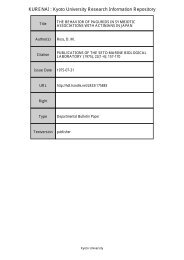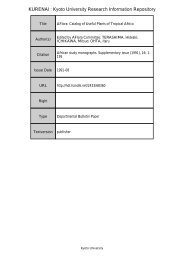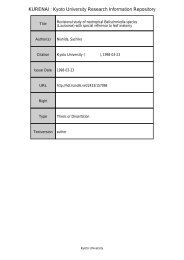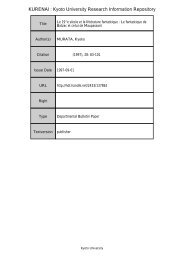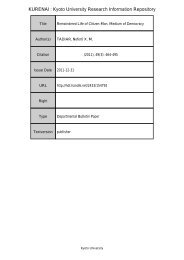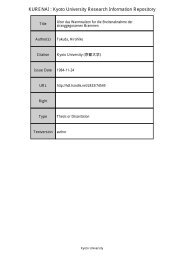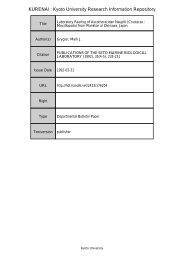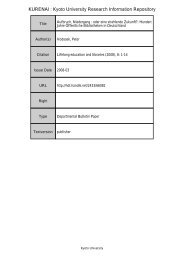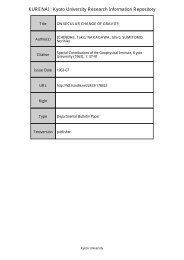THE HISTORICAL CONSCIOUSNESS OF GEORG LUKACS
THE HISTORICAL CONSCIOUSNESS OF GEORG LUKACS
THE HISTORICAL CONSCIOUSNESS OF GEORG LUKACS
Create successful ePaper yourself
Turn your PDF publications into a flip-book with our unique Google optimized e-Paper software.
<strong>THE</strong> <strong>HISTORICAL</strong> <strong>CONSCIOUSNESS</strong> <strong>OF</strong> <strong>GEORG</strong> LUKAcs \1<br />
by him -- into two types. One type is "the trend which places emphasis on<br />
social momentum, resistance of environment and physical force" and the other<br />
"the trend which places emphasis on human behaviour and the possibility for<br />
man to reform the world". And among the latter type are listed Lenin,<br />
Lnxemburg, and History and Class Consciousness by Lukacs"). Goldmann's central<br />
problem was the ideology necessary to prove that universal truth exists in the<br />
consciousness of the proletariat. In this case the change of reality and the cognition<br />
of history are combined, because of Lukacs' emphasis on consciousness in<br />
human conduct. "The act of being conscious and the act in itself are combined<br />
together actually and substantially" 26), and therein lie the peculiarity of Lukacs'<br />
ideology, the role of consciousness in reflecting history, and his characteristics as<br />
one of the many l\farxists of Western Europe, and at the same time we should not<br />
forget that it was Lukacs' tragedy that the act of being conscious of reality could<br />
never be any immediate change of reality.<br />
III<br />
Individual Consciousness and Class Consciousness<br />
Man in society is the entity that produces it, and at the same time he is also<br />
a product of the historical process. Society is something produced by man and<br />
yet it initiates action, independently of him, in conformity with its own law of<br />
nature. This objective world accepts the form of antithesis and this materialized<br />
world absorbs man into its own form. Needless to say, what is said applies to<br />
society producing capitalist commodities. Lukacs has made an excellent analysis<br />
of the process of materialization (Verdinglichung), which is to disunite everything<br />
that exists. This process of materialization pervades thoroughly from the lower<br />
composition to the higher composition, from objective to subjective, and finally<br />
to the extremities. It is not intended to discuss it here, but I want to point out<br />
that such emphasis on disunion of the capitalist society does have something in<br />
common with Utopian socialism, romanticism, and the capitalist view of realism.<br />
Now, the peculiarity of the Lukacs' thought was to treat the entity which<br />
reflects the historical process, i.e. consciousness and to criticize bourgeois ideology.<br />
In this case we can also see a variety of the Hegelian "Philosophy of History" in<br />
25) L. Goldmann, Sciences humaines et philosophic, 1952, Trans!. by Shimizu and Kawata, Human<br />
Science & PhiloJophy. Iwanami Shinsho, pp. 85-86.<br />
26) G. Lukacs, ibid., S. 14. In the beginning of the essay "What is Orthodox Marxism?" it is<br />
prescribed that "materialistic dialectics are the dialectics of revolution", since the objective process<br />
of history is the class consciousness of the proletariat according to him and the proletariat is the<br />
unification of subject matter and object matter in history.<br />
Discussions of the proletarian relationship between existence and consciousness as varieties of<br />
Marxian thought are seen in Mizuta, "The Position of Marxism in European Socialist Thought"<br />
Shiso, December 1964.<br />
'




